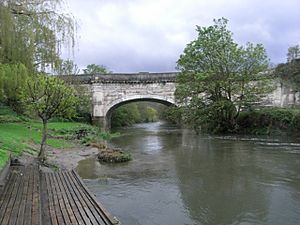Avoncliff Aqueduct facts for kids
Quick facts for kids Avoncliff Aqueduct |
|
|---|---|
 |
|
| Coordinates | 51°20′20″N 2°16′57″W / 51.3389°N 2.2825°W |
| OS grid reference | |
| Carries | Kennet and Avon Canal |
| Crosses | River Avon, Heart of Wessex Line |
| Locale | Avoncliff |
| Maintained by | Canal & River Trust |
| Characteristics | |
| Trough construction | Brick and stone |
| Pier construction | Brick and stone |
| Total length | 330 feet (100.6 m) |
| Traversable? | Yes |
| Towpaths | Both |
| Longest span | 60 feet (18.3 m) |
| Number of spans | 3 |
| History | |
| Designer | John Rennie |
| Construction begin | 1797 |
| Opened | 1805 |
The Avoncliff Aqueduct is a special bridge that carries the Kennet and Avon Canal over two important things: the River Avon and a railway line. You can find it in Avoncliff, Wiltshire, England. This amazing structure is about 2.4 kilometers (1.5 miles) west of Bradford-on-Avon.
It was built by a famous engineer named John Rennie and his chief engineer, John Thomas. They worked on it between 1797 and 1801. The aqueduct is considered a very important historical building. It has a special status called "Grade II* listed." This means it's a really important old building that needs to be protected.
Building a Big Bridge
Building the Avoncliff Aqueduct was not easy. The team first used stone from a local quarry. But this stone had a problem. When it got cold and frosty, the stone would crack. This caused parts of the bridge, like the support walls called buttresses, to fall down.
Because of these issues, some parts of the aqueduct had to be rebuilt. To make sure the bridge was strong and stable, they eventually used a different type of stone. They chose "Bath stone" from a place called Bathampton Down. This stone was much better and helped make the aqueduct strong.
How the Aqueduct is Built
The Avoncliff Aqueduct is quite long, stretching about 100 meters (110 yards). It has three large arches. The middle arch is the biggest, spanning about 18.3 meters (60 feet). The two arches on the sides are a bit smaller, each about 10.4 meters (34 feet) wide.
All the arches are made with special V-shaped stones that fit together tightly. The walls on the sides of the arches are built with different layers of smooth and rough stones. Soon after it was built, the middle part of the aqueduct started to sag a little. Because of this, it has been repaired many times over the years to keep it strong.
Keeping it Strong
In the 1900s, people worked to fix up the whole Kennet and Avon Canal. As part of this big project, the Avoncliff Aqueduct also got a major repair. In 1980, they added a concrete "cradle" inside the aqueduct. This made sure the aqueduct was completely watertight, so no water from the canal could leak out. These repairs helped keep this historic structure in good shape for many more years.
Gallery
-
The aqueduct seen from the Bradford-on-Avon side, with the River Avon beneath
See also
 In Spanish: Acueducto de Avoncliff para niños
In Spanish: Acueducto de Avoncliff para niños
 | Isaac Myers |
 | D. Hamilton Jackson |
 | A. Philip Randolph |




